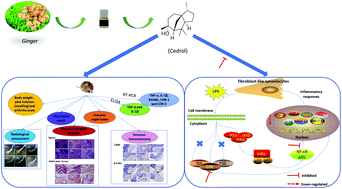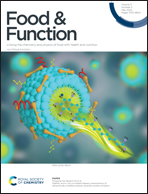Cedrol attenuates collagen-induced arthritis in mice and modulates the inflammatory response in LPS-mediated fibroblast-like synoviocytes
Abstract
Ginger has been used as a flavoring agent and traditional medicine for a long time in Asian countries. Pharmacological studies showed that it has antiemetic, anti-inflammatory and analgesic effects, which is attributed to its chemical constituents. The aim of the present study is to investigate the anti-rheumatoid arthritis properties of cedrol (CE) found in ginger. In an in vivo anti-RA study, CE remarkably alleviated the paw swelling and arthritis score in CE-treated CIA mice compared with the model group. The neutrophil count and the productions of TNF-α and IL-1β were inhibited, and the expressions of Rankl, Cox-1 and Cox-2 were down-regulated at the mRNA level. Radiologic evaluation, histopathological analysis and immunohistochemistry indicated that CE ameliorated inflammatory cell infiltration, synovial hyperplasia, and bone and cartilage damage, and exhibited an immunotherapeutic effect. The MTT assay demonstrated that CE (10−10–10−5 M) had no cytotoxicity on fibroblast-like synoviocytes (FLSs), and exhibited an inhibitory effect on the proliferation of LPS-induced FLSs at concentrations of 10−6 M and 10−5 M. Mechanism research showed that the suppressed expressions of pivotal inflammatory mediators including COX-1 and COX-2 subsequently reduced the production of PGE2, thereby causing the secretions of pro-inflammatory cytokines, ultimately attenuating the progression of inflammation. Meanwhile, the reduction in the mRNA levels of Mmp-13 and Mcp-1 responsible for osteoclastogenesis resistance was detected. This illustrated that CE showed anti-rheumatoid arthritis properties via blocking the phosphorylation of ERK/MAPK and p65/NF-κB signaling pathways in LPS-activated FLSs. The current research suggested that CE is an important functional component in ginger, which may be a promising candidate drug for RA therapy.



 Please wait while we load your content...
Please wait while we load your content...